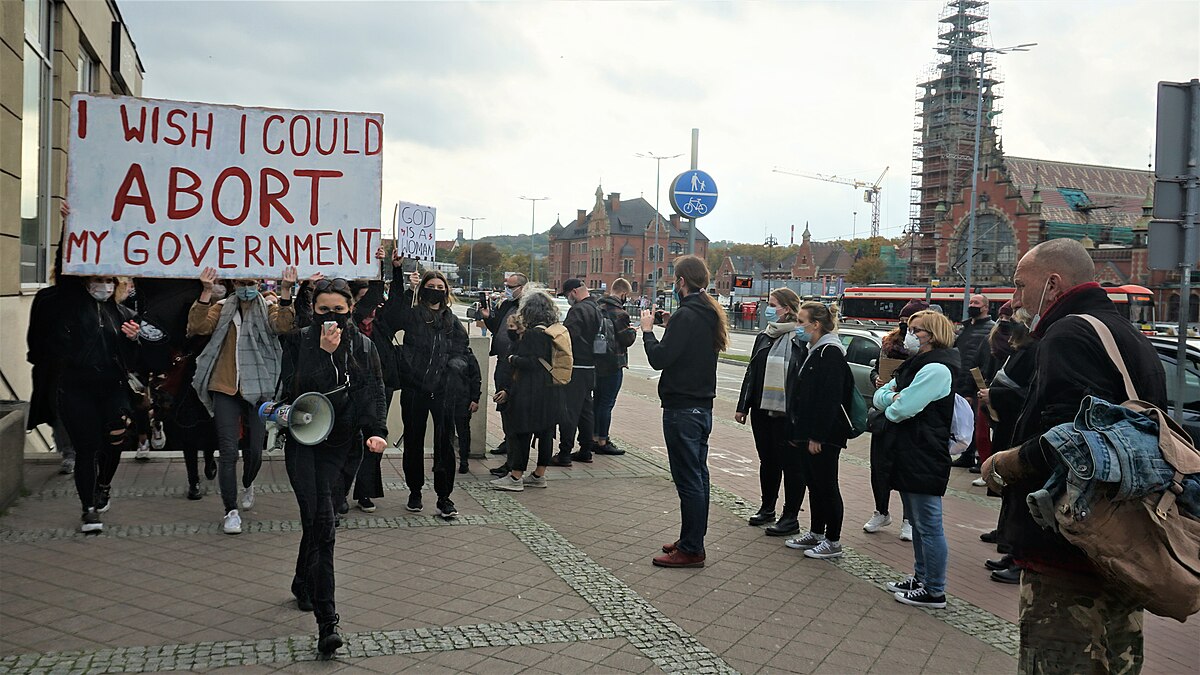Abortion Law in Poland in 2021

The Polish Commissioner for Human Rights condemned the Constitutional Court’s decision on the abortion law in Poland and the justification attached to it on 27 January 2021, stating that it severely restricts women’s rights.
Regarding the topic, Europe’s formerly Communist countries have liberal laws. Poland is the only exception, in a country that has traditionally been a bastion of Catholicism – urban youth is undergoing rapid secularisation – abortion is allowed only in cases of risk to the woman’s life or health or when the pregnancy results from rape or incest. Previously, abortion in case of fetal defects was legal, but it was ruled unconstitutional by the country’s Constitutional Tribunal on 22 October 2020. United Nations independent human rights experts criticised it and called for the Polish authorities to respect people who were protesting against it.
The October decision sparked weeks of mass protests
On 22 October, the panel ruled unconstitutional a law that a woman can terminate a pregnancy if it is likely to give birth to a child with serious health problems. However, the conclusion of the Constitutional Court could only come into force together with the reasoning. Even though the decision has not been in power so far, women’s rights activists have complained that hospitals have already cancelled scheduled abortions because they feared some form of official punishment.
The abortion law in Poland became legal
The provision questioned by the Constitutional Court is one of the three exceptions under which the abortion law in force since 1993 has allowed abortion. In addition to severe health damage, abortion was possible in cases where the mother’s life or health has been in danger, or if the life conceived is the result of a crime – rape or incest. Thus, only the last two conditions remain. The Constitutional Court stated in its thinking that the likelihood of severe injury or incurable illness to the fetus is not a sufficient reason to deprive a person before the birth of his life.
The state wants to restrict their rights further, risk women’s lives, and condemn them to torture. However, the abortion ban has now come into force.
How little help the Polish state provides to families raising children with disabilities.
The protest against abortion law in Poland represents the fear of the Polish women, according to them the state is only interested in the mother and her disabled child until the birth, and then leaves them alone. The Polish system of care for people with disabilities, the level of benefits doesn’t provide sufficient support and assistance to families. And what happens to people with disabilities after their parents die is the biggest fear for parents.
Abortion Law in Europe
Abortion is legal in most European countries. Restrictions on abortion are most potent in a few countries that are intensely observant of the Catholic religion.
- Malta is the only country within the EU that bans abortion in all cases. It has no exception for situations where the woman’s life is in danger.
- In the micro-states of Vatican City, San Marino, Liechtenstein and Andorra, abortion is illegal or severely restricted.
- Abortion in Italy was legalised in 1978. However, the law allows health professionals to decline to perform an abortion.
- In Ireland, before December 2018, abortion was illegal except cases where her pregnancy’s continuation endangered a woman’s life. However, in a 2018 referendum, many Irish citizens voted to repeal the constitutional amendment prohibiting legislation relating to the termination of non-life-threatening pregnancies. The new law authorised (the Health (Regulation of Termination of Pregnancy) Act 2018) allows abortion on request up to 12 weeks of pregnancy, and in certain circumstances at later stages.
- In Finland, technically abortions even just up to 12 weeks require authorisation from two doctors (unless exceptional circumstances). Still, it is only a stamp in practice, and it is granted if the mother does not wish to keep the baby.
- Sweden and the Netherlands have more extended time limits. Abortion is allowed after the first trimester and only under certain circumstances, such as risk to woman’s life or health, fetal defects or other specific situations related to the conception or the woman’s age.
- In Austria, second-trimester abortions are allowed if there is a risk to the woman’s physical or mental health. Also, in case of severe fetal impairment or if the woman is under 14 years of age.
- Denmark, allow abortion after the first trimester for various reasons, including socioeconomic ones, but a woman needs the authorisation to have such an abortion.










